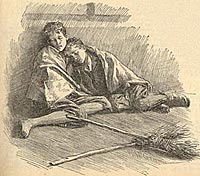On the Streets

What was it like to be poor: to have no shoes, to work long hours before school, to earn a few pennies for your family, to be homeless in the city and work in dirty factories for just enough to eat?
Click on this photographs
link to see photos of street children and then read the fact file and
try the worksheet.
What do you think?
- Why do you think people wanted to live close to where they worked?
- How would working for 3 hours early in the morning affect your school
work?
- What kind of work do you think the boys in the drawing had been
doing?
- Do you think the children were bothered about getting into 'beds
which were never cool'?
Printable worksheets and source material:
 |
|
 |
|
- In the towns everyone wanted to live near his or her work
and this caused overcrowding.
- Many people could not afford the rents that were being charged and so they rented out space in their rooms to one or two lodgers who paid between two pence and four pence a day.
- The children played in the narrow alleys and dark staircases
and had very little sunlight.
- Children from poor families were sent out to work. A boy of
11 was paid 4 shillings a week to work 43 hours delivering parcels
from a chemist's shop. A child of 9 delivered milk for 21 hours
a week.
- Some children started work at 5am and worked for 3 hours before
school.
- The longest hours were worked by the lather boys in the barbers’
shops.
- Gangs of pauper children were apprenticed in factories and
worked very long hours in extremely unsanitary conditions.
- This extract is from Our Waifs and Strays
March 1903. 'They were fed upon the coarsest and cheapest food,
often with the same as that served out to the pigs of their
master. They slept by turns and in relays, in filthy beds which
were never cool; for one set of children were sent to sleep
in them as soon as the others had gone off to their daily or
nightly toil'.
|
|
 |
|  |
| 